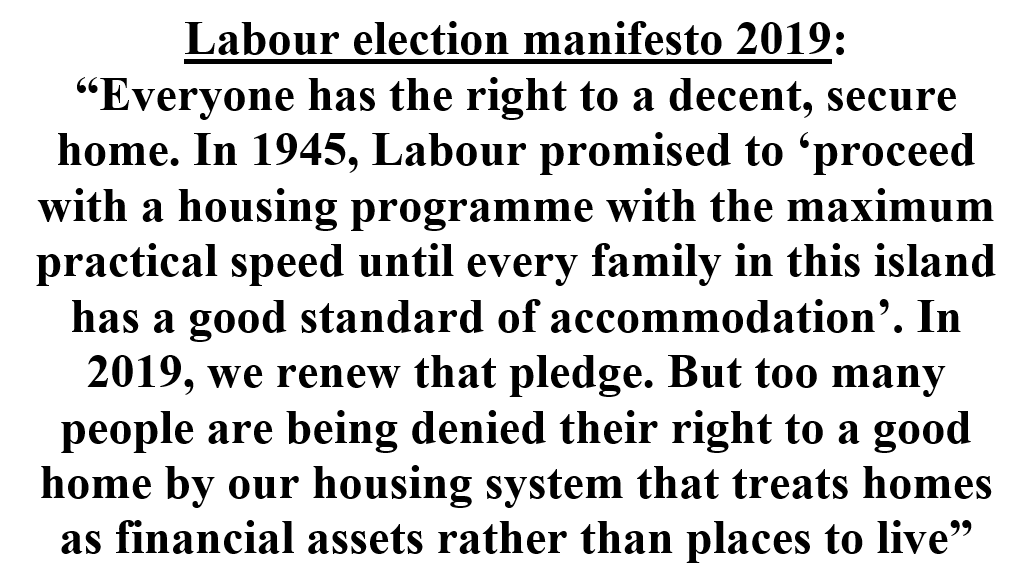While the Labour leadership has been busy opening a one-sided assault on its own party left wing, it has been conspicuously absent from the field of battle when it comes to offering anything resembling policies.
Yet we see in Berlin this month an excellent example of a policy initiative of the sort that could catapult Labour into the lead in opinion polls and win back the support of millions of lost voters. In a month’s time the German capital will hold a referendum on the expropriation of the private rented sector, in an effort to abolish the unending treadmill of rising rents and poor standard of accommodation for the city population.
In Germany in general, the rented sector dominates housing: the proportion of tenants is higher than in most other European countries. At the federal level, tenants make up 60% of the housing market and in Berlin it is around 85%. Big corporate landlords have been jacking up rents and doing little to maintain housing in a decent condition. In the past five years, rents have soared by as much as 40 per cent, meaning that housing costs are extracting an increasingly (and unsustainably) high proportion of family income.
350,000 signatures to expropriate big landlords
Among the biggest culprits are huge housing corporations like Deutsche Wohnen (see graffiti in picture above, “expropriate Deutsche Wohnen”) with 110,000 apartments, and Vovania, with 50,000. These two companies plan to merge, increasing their stranglehold over housing even more significantly.

Berlin campaigners as long ago as 2015 began to fight for rent caps, and it was because of these campaigns that the federal government introduced modest controls in 2018. Federal limits, however, still allowed for a 15 per cent rent increase over three years. The Berlin city council then introduced much stricter rent controls in 2020, this time largely because of the pressure of a campaign to expropriate big landlords. But this cap was struck out by the German courts.
The legal system may have struck down the rent cap, but the campaign for expropriation goes on…with the aim of the city council taking over all those big landlords with 3,000 rental properties or more. The Berlin campaigners have already reached a total of 350,000 signatures, and the proposal will be put to a referendum on September 26. It has an excellent chance of being agreed, with polls already showing 49% in favour and 43% against.
The campaign in Berlin is sending shock waves around Germany and, indeed across Europe. Big corporate landlords like those in Berlin have increasingly dominated the private rented sector on the continent, as well as in the UK. According to the Financial Times, “the market capitalisation of Europe’s publicly listed residential property sector has grown from €3.5bn in 2006 to nearly €85bn at the end of July this year”. That is a twenty-four-fold increase, in fifteen years.
Housing could be a decisive policy for Labour
The campaign in Berlin is setting an example that ought to be followed by the labour movement internationally. Here in the UK, housing is a key political issue and one that could be a decisive weapon in Labour’s armoury. In the UK, the private rented sector has boomed in the last thirty years. Without a doubt the cost of private rented housing has been the single most important factor in the massive explosion of ‘in-work’ poverty.

The biggest UK private residential landlord is Grainger, with over 9,000 properties and a market capitalisation of over £2bn. But the Lloyds Banking Group are aiming to far surpass that, with the intention of setting up a private renting division with the strategic goal of owning 50,000 properties by 2030. According to the Financial Times (August 19), “Tax changes have led to a reduction in the number of small-scale landlords who previously dominated the UK rental sector, but a shortage of housing and increase in the number of families renting has encouraged more large companies to enter the sector in recent years.”
In 2018, five million households in the UK rented from a private landlord, more than twice the number of 2000. This is equivalent to 13 million people, or 20% of the population. In London the figure is 29%. The entire thrust of Tory policy since Margaret Thatcher has been to expand the private rented sector at the expense of social housing.
The policy of council house sales and successive government policies have reduced social housing to such a degree that the shortfall in housing has inevitably been filled by private landlords, often unwilling to provide repairs and upkeep, but more than happy to bump up rents to whatever the ‘market’ will tolerate. It is naked exploitation of the desperation of poorer families to get a roof over their heads.
Forced council house sales – even against the wishes of many local Labour authorities – have caused a massive depletion in the stock of social housing available to low-income families, because those council homes have simply not been replaced, forcing families into the private rented sector.
Discounted council house sales represented a massive transfer of billions of pounds of public property to the private sector. Although it was ostensibly a policy aimed to benefit individual families, in reality – as was predicted – it benefitted private landlordism. Of those properties bought by tenants under ‘right to buy’ in the last thirty years, 40% are now in the private rented sector. What is utterly shameful is that successive Labour leaders from Blair onwards – with the notable exception of Jeremy Corbyn – refused to make any commitment to abolish the right to buy.

In the past ten years, the divide between the haves and have-nots has grown even more, as mortgages have increasingly been offered only to the most well-to-do, as they week ‘buy to rent’ house purchases.
According to an article in the Guardian in January 2020, private renting and its stresses are a major cause of illness and mental health issues. “Private renting is making millions of people ill with almost half of England’s 8.5 million renters experiencing stress or anxiety and a quarter made physically sick as a result of their housing, campaigners have said.
“Unaffordable rents, poor living conditions and the risk of eviction are causing a quarter of people – about 2.7 million – to feel hopeless while more than 2 million have been made physically ill, according to polling of nearly 4,000 private renters on behalf of housing charity Shelter”.
Labour’s 2019 election manifesto
We know that the Tory Party is in the pocket of the land speculators, the housebuilders, and private landlords. But Labour should be the champion of all those families looking to rent or buy their own home at a genuinely affordable rate.
Under the leadership of Jeremy Corbyn, the Labour Party at least had a policy on housing; it adopted quite radical commitments in its two general election manifestos. The 2019 manifesto singled out the “More than 11 million people” who rent in the private sector, noting that “many of them are at the sharp end of the housing crisis”. A number of very radical measures were adopted, as these extracts show:
*We will act on every front to bring the cost of housing down and standards up, Labour will deliver a new social housebuilding programme of more than a million homes over a decade, with council housing at its heart.
*By the end of the Parliament we will be building at an annual rate of at least 150,000 council and social homes, with 100,000 of these built by councils for social rent in the biggest council housebuilding programme in more than a generation.
*We will stop the haemorrhage of low-cost homes by ending the right to buy, along with the forced conversion of social rented homes to so-called ‘affordable rent’.
*We will review the case for reducing the amount of housing debt councils currently hold.
*We will give councils the powers and funding to buy back homes from private landlords.
* We will take urgent action to protect private renters through rent controls, open-ended tenancies, and new, binding minimum standards.
*Labour will stop runaway rents by capping them with inflation and give cities powers to cap rents further.
These policies – and more – need to be at the forefront of any socialist campaign on housing, and as long as the Labour Party remains a vehicle for the aspirations of ordinary working-class people, then socialists should use every means: affiliated trade unions and Party meetings especially, to argue for them. We need to point out that housing policies alone could win elections for Labour.
We should stand in complete solidarity with campaigns like those in Berlin. We would have no argument with those workers who have an additional property as a guarantee of income in later life – it is no different, in effect, to a pension pot. But as socialists we are on the complete opposite side of the fence to the large landlords with hundreds of properties, whose only interest is to squeeze the maximum out of their tenants, at little cost to themselves.
Snouts have been in the trough long enough
Unlike in Berlin, where there are arguments over the cost of expropriation of the big landlords – where ‘compensation’ estimates vary from €8bn to €36bn – socialists should advocate expropriation of the big landlords companies without compensation, on the grounds that their snouts have been in the trough long enough.
As we have argued in relation to other social issues, extraordinary times call for extraordinary measures. As one of the Berlin campaigners told the Financial Times, “Housing is not a luxury. It should be a human right — just like access to drinking water, education or health.” The only way to genuinely tackle the problem of housing and to satisfy everyone’s right to a decent home, is to take housing out of the realm of the marketplace. The so-called free market is rigged to create a permanent shortage to keep up the cost of buying and renting accommodation.
Labour has to argue for socialist policies for housing:
*The nationalisation of the big house-building companies and the land banks. No more enrichment of speculators.
*Establishment of a national house-building corporation, linked to local authority housing departments.
*A target of building a million affordable and energy-efficient homes a year. *Finance for local authorities to establish direct works programmes and to build social housing at genuinely affordable rents.
*Abolition of the right to buy.
*Municipalisation without compensation of all private landlords with multi-property portfolios above a certain size.
It may seem largely irrelevant with the Starmer/Evans axis in control of the upper echelons of the Labour Party, but we have to take the fight to Labour’s right wing in political terms. They have nothing to offer working class people and that fact needs to be exposed. The right wing treat the genuine aspirations of Labour’s core voters as ‘problems’ that challenge their careers and their fondness for capitalism. The only way ultimately to defeat the right wing of the Labour Party is on political issues and there are few issues as pressing as housing on which we should be happy to cross swords with them.
The Berlin campaign is a sign of things to come. We will await the outcome of the referendum on September 26 with interest. It is likely that there will be legal and constitutional obstacles put in the way of the expropriations of private landlordism – as there was against a rent cap – but whatever the outcome, that kind of campaign is the music of the future. One of the most basic of all human aspirations is for a roof over one’s head, and no amount of legalistic chicanery or vacuous political speeches should stand in the way.



